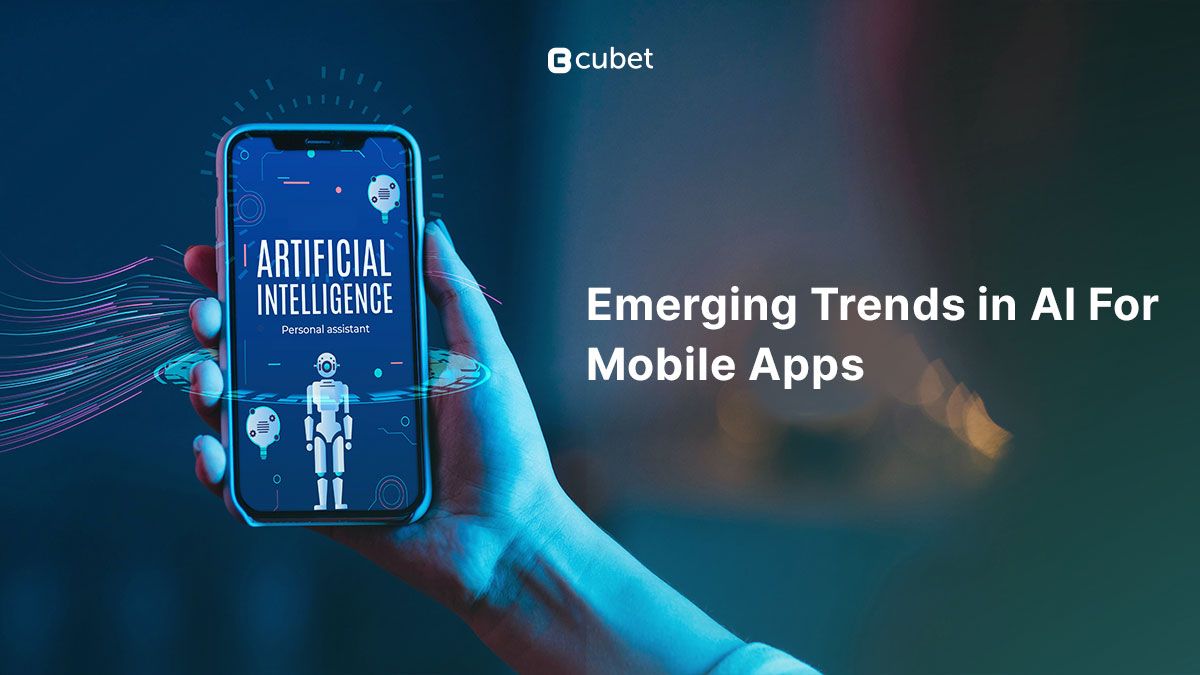Studies suggest the downloads of AI (Artificial Intelligence) chatbot apps have increased by 1506%. This surge is a testament to AI's growing influence on mobile app development, leading to a new breed of apps that are smart companions.
These apps can now learn what users like, make them safer, and make it easy to connect with them by recognizing their voices and gestures. Adding AI also makes it easier to analyze data in real-time, which makes IoT devices respond faster to mobile apps.
Let's dive deeper into the current trends.
AI-Driven Innovations in Mobile Apps
The combination of AI and mobile apps is changing the digital world and setting new standards for how apps work. Let's look into the top seven AI trends shaping the future.
1. 5G Technology
5G is changing what AI can do in mobile apps by delivering unprecedented speeds, enabling real-time responses and conversations. This cutting-edge network technology enhances data transmission rates, empowering AI to process information at unparalleled speeds. For instance, 5G technology dramatically accelerates the performance of Google Translate's AI-driven language translation capabilities on mobile devices. This makes it much easier for users to conversate in different languages.
Additionally, 5G boosts augmented reality apps by letting them generate graphics with almost no latency. This improvement allows virtual elements to blend in easily with the real world. Besides, it makes learning, playing games, and shopping more enjoyable for users. When 5G and AI work together, they set a new standard for mobile apps that need to handle vast amounts of data to have advanced features quickly.
2. AI & Machine Learning Integration
Machine learning algorithms are essential for determining what users want, which helps apps give users a more personalized experience. These algorithms let apps change users' preferences by looking at how they interact and behave. This makes each experience very tailored. With the advent of AI, mobile applications now have features that were once considered futuristic.
Predictive typing saves time by suggesting the next word based on user typing habits. Every algorithm understands the intent behind your searches, providing more accurate and relevant results. Personalized content is no longer a perk but a standard, with apps curating content to match user interests and past behaviors.
These advancements are changing the interaction with mobile devices, making them responsive and personal.
3. Cross-Platform Development
AI is simplifying the creation of apps that operate across different gadgets. It's speeding up how we write code, making it less about manual labor and more about automation. This helps developers avoid mistakes and get apps into users' hands faster.
When it comes to design, AI is a real game-changer. It's helping to craft interfaces that are easy to use, whether on a phone or a computer. This smooths out the experience for everyone, ensuring that the app looks good and feels right, no matter where you use it.
In essence, AI is the unseen force that's making apps more versatile and user-friendly.
4. Progressive Web Apps (PWAs)
Integrating AI into Progressive Web Apps (PWAs) can significantly enhance their development and functionality. AI-powered PWAs are smarter at marketing and interacting with users, adapting to individual needs.
This marks a big step in making web apps easier to create and more user-focused. People enjoy better experiences, businesses connect more, and businesses can aim for personalized digital excellence.
5. IoT Integration
AI is revolutionizing how we interact with IoT devices through mobile apps. It's the driving force behind the scenes, enabling real-time data analysis and device management. With AI, your mobile app becomes a universal remote for your smart home or office. It learns your tastes for temperatures, lighting, and even if to make coffee, so it can make your environment the way you like it.
Using AI to connect IoT devices to mobile apps improves security by letting you get tips and take action immediately based on real-time data. For example, if a security camera sees something strange, AI can look at the video and decide if you should get a text message immediately on your phone.
This innovative integration is making IoT ecosystems smarter and easier to use by giving users a simple way to connect and control their network of linked devices. It's a step towards a future where your phone is the central hub for a brighter, more connected living and working space.
6. Enhanced App Security
AI is stepping up to strengthen app security. It's now equipped with systems that can detect and neutralize threats as they happen. This proactive approach means that AI constantly learns and updates its methods to deal with the latest security challenges.
It's like having a vigilant guard who never sleeps, always looking for anything suspicious. Besides, it's all about protecting your data. AI is becoming the shield that adapts and evolves, keeping user information under lock and key. With AI's help, mobile apps are becoming safer places for the data to live.
7. Voice and Gesture Recognition
Mobile apps are improving at understanding and doing what you say because speech recognition technology is improving. With this update, apps can understand and follow spoken instructions better. This makes exchanges more natural and quick.
On the other hand, gesture detection is helping to make new user interfaces better. With this technology, apps can react to your movements, so you can use them without using your hands. This can be especially helpful when you don't want to use your fingers, like when cooking or driving.
These technologies are not only making mobile apps faster but also they are giving users more ways to use their devices. They are making it possible for everyone to use and interact with the site in ways that suit their needs and tastes.
Conclusion
Incorporating AI into mobile apps is a business choice for companies seeking to enhance user experience significantly. The rising influence of AI in mobile app development ensures the creation of applications that provide utility and deliver high levels of personalization and security.
AI stands at the forefront of progressive advancements in mobile technology, bolstering security measures and enabling seamless connections through voice and gesture recognition.
If you’re ready to elevate your mobile apps with AI, schedule a demo and experience firsthand how Cubet leverages AI's dynamic learning capabilities to enhance application development. Embrace a future where the digital world becomes an integral part of our daily lives like never before.
FAQs
1. How is AI influencing the personalization of mobile apps?
AI is improving mobile app personalization by looking at user data to make interactions more relevant. AI algorithms can create a personalized app experience by learning about users' habits, likes, and patterns. This lets them offer content, guess what users will do, and imagine what they need. This means your news app learns what articles you enjoy, or your music app knows your workout playlist.
2. Can AI improve the battery life of mobile devices through apps?
Yes, AI can optimize app performance to reduce battery consumption. By learning usage patterns, AI can adjust app activity and resource allocation, ensuring that your device runs only the necessary processes, thereby extending battery life.
3. How are AI-powered mobile apps enhancing accessibility for users with disabilities?
AI is breaking barriers in accessibility with features like voice-to-text, language translation, and image recognition, making apps more usable for individuals with disabilities. For example, an AI app can describe visual content to a visually impaired user or interpret sign language in real time.
4. What role does AI play in mobile app security?
AI is pivotal in mobile app security, offering real-time threat detection and response. It can learn to identify patterns associated with malware or phishing and automatically take action to protect user data. AI security systems continuously evolve, staying ahead of new threats.
5. How is AI shaping the future of mobile gaming apps?
AI is transforming mobile gaming by creating more immersive and dynamic game environments. It can generate responsive, adaptive, and unpredictable game scenarios, enhancing the gaming experience. AI also enables personalized gaming experiences by adjusting difficulty levels and in-game assistance based on the player's skill level.
Have a project concept in mind? Let's collaborate and bring your vision to life!
Connect with us & let’s start the journey
Share this article

Get in touch
Kickstart your project
with a free discovery session
Describe your idea, we explore, advise, and provide a detailed plan.



























